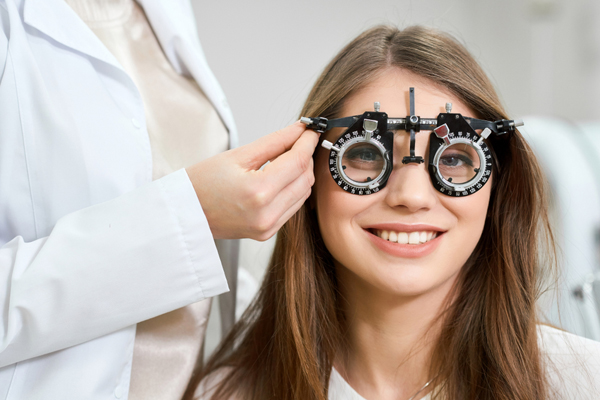What Is Glaucoma and How Does an Optometrist Treat It?

Looking for more information on glaucoma? An optometrist is an eye care professional who can treat vision problems and eye health problems, as well as prescribe patients with the necessary eyeglasses or contact lenses they need in order to see clearly. If you are currently experiencing problems with your eyes, know that common symptoms of glaucoma include throbbing eye pain, blurry vision, foggy vision, redness within the eye and pain experienced on the same side of the problem eye.
About optometrists
Want to understand more about what an optometrist does? Those who are interested in eye care as a profession spend an average of eight years learning how to become an optometrist, a.k.a. an eye doctor. Once they have completed their education and training, they will receive their Doctor of Optometry degree. This allows them to examine patients for both vision and eye health problems and prescribe eyeglasses and contact lenses.
Optometrists are able to detect eye problems in their patients, as well as diagnose and manage them. Optometrists who have undergone education in the United States are also able to prescribe medications to their patients in order to treat any eye problems or eye diseases. When it comes to in-depth eye care treatment, it depends on the state that the optometrist is practicing in when it comes to how much medical assistance they are allowed to provide their patients
What is glaucoma?
Glaucoma is an eye condition that causes the eyeball to be under an abnormal amount of pressure, which could result in someone losing their eyesight. This condition is one that damages the eye's optic nerve and will get worse over time if not treated. According to Glaucoma.org, people are at an increased risk of glaucoma if their parents or siblings have the disease, if they are African American or Latino, if they are diabetic or if they have cardiovascular disease.
When it comes to treating glaucoma, optometrists can help patients who have a routine case of glaucoma. When it comes to treating more severe cases of glaucoma, an optometrist will often refer a patient to see an ophthalmologist, as this eye care professional can perform laser treatments and eye surgery
How does an optometrist treat glaucoma?
An optometrist will first perform a comprehensive eye exam in order to understand the patient's current symptoms. This requires them to place special drops in the patient’s eyes that help the pupils get bigger, as this allows the optometrist to closely look into the patient's eye, including the optic nerve, for any signs of glaucoma. A special instrument is then used to measure the patient's eye pressure. The results of the exam will determine treatment, which can include taking prescribed medicated eye drops and oral medications, both of which can help minimize abnormal eye pressure.
Can we schedule you for a consultation appointment?
Making an appointment with a professional optometrist is your next step if you think you might have glaucoma. This chronic eye disease can cause discomfort and pain, and for that reason, you need to be diagnosed so you can know for sure whether you indeed have glaucoma. If you do, know that there are treatments available.
Request an appointment here: https://brighteyesmv.com or call Bright Eyes Optometry at (914) 668-1429 for an appointment in our Mt Vernon office.
Check out what others are saying about our services on Yelp: Read our Yelp reviews.
Recent Posts
Emergency eye care is needed if you find yourself dealing with a problem with your eye that causes pain or affects your vision. Failing to treat eye injuries as soon as they are detected can lead to permanent consequences, like reduced vision or blindness. Common eye injuries that require emergency eye care include: Exposure to…
Looking for more information on eye protection? An ophthalmologist knows everything there is to know about protecting the eyes. While there are a few different types of eye care professionals, ophthalmologists are eye care professionals who have undergone additional years of education and training so they can offer their patients both medical and surgical eye…
Controlling myopia at an early age can slow down its progression. This can help prevent yearly upgrades for stronger glasses. Your optometrist can help by offering various treatments. If you want to find out how your optometrist can help control myopia, here are the details.Optometrists use atropine eye drops to achieve short-term myopia control results.…
Another word for an itchy eye is ocular pruritis. It is a common health situation in many people. Itchiness in your eyes is more than enough reason to see an optometrist. Receiving prompt treatment is important in receiving prompt relief. If you want to know what causes an itchy eye and the treatments for it,…



